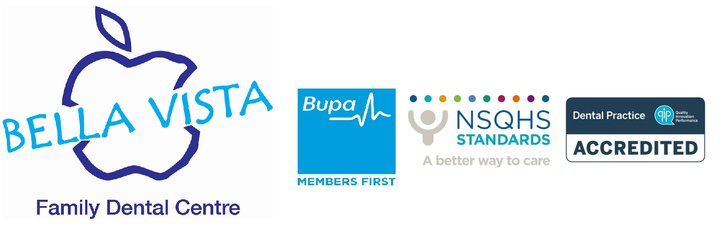Grinding and TMJ Problems
What is grinding?
Grinding also known as bruxism is the involuntary clenching, grinding and gnashing of the teeth. About half of the population does it from time to time. Around five per cent of the population are regular, forceful tooth grinders. Often it happens during sleep, but some people grind their teeth when they are awake.
Usually, a person doesn’t realise that they grind their teeth in their sleep. The partner who shares their bed (and hears the grinding noises at night) is often the first to notice the problem. Parents may also hear it in their sleeping children.
Teeth grinding can be a result of stress. For example, some people grind their teeth when they are angry, concentrating or feeling anxious.
Symptoms of grinding
Signs and symptoms of bruxism include:
Treatment options for grinding
At Bella Vista Family Dental Centre we offer the full range of treatment options for teeth grinding including:
Other treatments that may help to manage teeth grinding include:
TMJ problems
The temporomandibular joint (TMJ) is comprised of muscles, blood vessels, nerves and bones. There are two TMJs, one on each side of your jaw. TMJ disorders are problems or symptoms of the chewing muscles and joints that connect your lower jaw to your skull.
The cause of pain in TMJ includes:
Grinding also known as bruxism is the involuntary clenching, grinding and gnashing of the teeth. About half of the population does it from time to time. Around five per cent of the population are regular, forceful tooth grinders. Often it happens during sleep, but some people grind their teeth when they are awake.
Usually, a person doesn’t realise that they grind their teeth in their sleep. The partner who shares their bed (and hears the grinding noises at night) is often the first to notice the problem. Parents may also hear it in their sleeping children.
Teeth grinding can be a result of stress. For example, some people grind their teeth when they are angry, concentrating or feeling anxious.
Symptoms of grinding
Signs and symptoms of bruxism include:
- grinding sounds while the person is asleep
- headache, jaw joint and/or ear pain
- aching teeth, particularly just after waking up
- aching and/or stiffness of the face and temples just after waking up
- aching or stiffness in the jaws while chewing, particularly during breakfast
- clenching the jaw when angry, anxious or concentrating
- temperature-sensitive teeth
- cracked or chipped tooth enamel
- tooth indentations on the tongue
- raised tissue on the inside of the cheek caused by biting
- loose teeth
Treatment options for grinding
At Bella Vista Family Dental Centre we offer the full range of treatment options for teeth grinding including:
- repair of tooth damage
- fixing fillings that are too high
- a special mouthguard (‘bite splints’) to wear at night so that the guard is worn down instead of your teeth. In most cases, a bite splint will only help with the symptoms and will not stop you from grinding altogether.
Other treatments that may help to manage teeth grinding include:
- stress management therapy
- relaxation techniques
- cognitive behaviour therapy
- regular exercise
- medication that relaxes the muscles
TMJ problems
The temporomandibular joint (TMJ) is comprised of muscles, blood vessels, nerves and bones. There are two TMJs, one on each side of your jaw. TMJ disorders are problems or symptoms of the chewing muscles and joints that connect your lower jaw to your skull.
The cause of pain in TMJ includes:
- The result of displacement of the cartilage disc that causes pressure and stretching of the associated sensory nerves
- A bad bite or orthodontic braces stress and tooth grinding
- Biting or chewing difficulty or discomfort
- Clicking, popping or grating sound when opening or closing the mouth
- Dull, aching pain in the face
- Earache
- Headache
- Jaw pain or tenderness of the jaw
- Reduced ability to open or close the mouth

